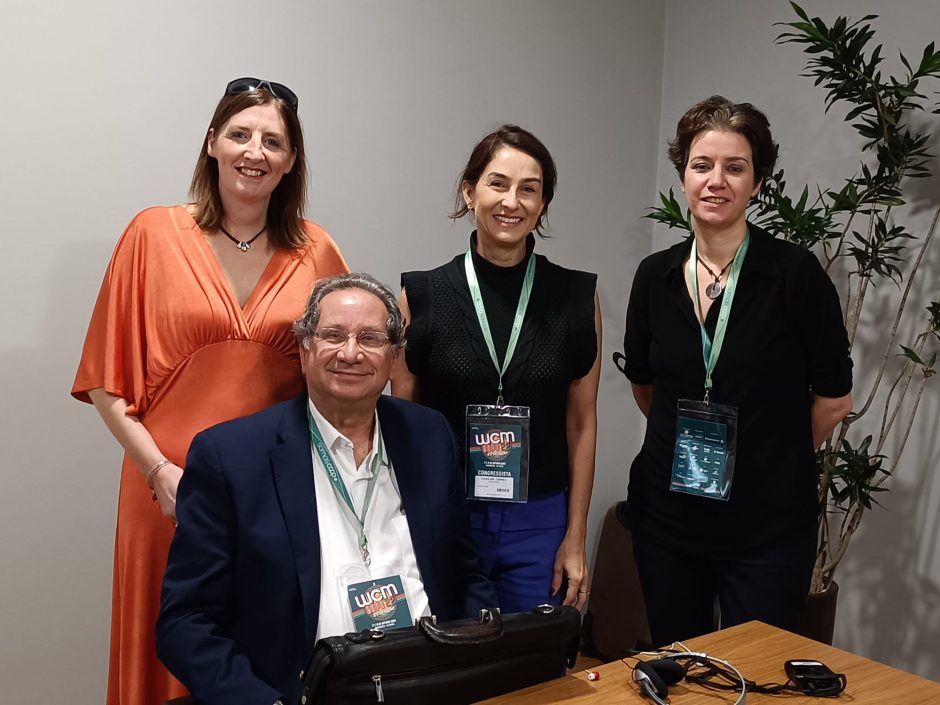In October, Rose Marley, secretary general of Co-operatives UK, and Sarah Alldred, head of international partnerships at the Co-operative College, attended the World Coop Management conference in Rio de Janeiro, Brazil.
Organised by the Organization of Brazilian Cooperatives (OCB), the event looked at the role of technology and innovation in shaping the way co-operatives form and engage with their members and the wider world.
“The timing of the conference was right in the middle of Brazil’s national elections,” says Alldred, “so I was curious how things would feel. There had been a clear rise in populism since Bolsanaro took power, the runoffs were close, and I wondered how the co-operative movement was responding to this (it was mixed).”
She adds: “The event itself was impressive in scale and numbers attending. Brazil has a strong co-operative history – its movement was founded in 1889 in Minas Gerais. Currently, they have just under 7,000 co-ops covering a membership of 14.5 million. It was impressive to be in the middle of this – Brazil is a huge country, and the movement is equally huge.
“As part of the conference mix, it was great to formally meet with OCB, Brazil’s national co-op apex body, as the Co-op College has been working with them over the past year to develop a series of study tours and work with their network of co-operative colleges. We also got to meet Carolina Torres, the chair of a brilliant co-operative school called Escola Favoo. They are keen to hook into the College’s Youth Co-operative Action programme so we started to explore options.”
Alldred and Marley, who are members of Co-operatives UK’s International Working Group (IWG), also engaged with other conference delegates, highlighting case studies from the UK co-operative movement.
“One of the key learning insights I took away was about how crucial embedding the co-operative values and principles are in the booming platform co-operative sector,” said Alldred, “and therefore the unique position the co-op movement has in shaping ethics and values in the online space. I also learned a lot about the principles of the circular economy and how crucial this thinking will be as we move towards a net zero world.”
For Marley, the key takeaway was the “affirmation of how co-operatives really do enable effective community wealth building and innovation when strategic thinking is applied”.
In addition to delivering a keynote speech, she participated in a panel on the circular economy. “It’s critically important to a sustainable future,” she says, “and co-operatives have been referenced by both the UN and Europe as an effective model to achieving impact in this way.
“I was also delighted to share the work of Midcounties Co-op – particularly its work with Fairphone and how that delivers against the key elements of the circular economy.”
She adds that she was “particularly struck” by a speaker from a concrete manufacturer in Sao Paulo. “Although not a co-op itself, the organisation has reduced its fossil fuel consumption by 45% by creating an ‘acai’ collecting co-op. Acai berries are turned into bio fuel and used to fuel the manufacturing plant, so alongside fossil fuel reduction there’s work and opportunities created locally. It was a truly inspiring story.”

Also on the conference agenda was revolutionary work being done by co-ops in the platform economy. Marley feels that the UK is leading in terms of stimulating work around co-op platforms and co-ops in tech. “I opened the Coop Tech element of the conference with a keynote speech – on the invite of Gusativo Mendes Nascimento. I felt, to an extent, that I was ‘stating the obvious’, but I really wasn’t. We are ahead of the game here in the UK in terms of innovation and acceleration of platform co-ops – and understanding the relevance to tech, generally.
“I shared the thinking behind a theme of our current strategy at Co-operatives UK: to enable tech to disrupt like our pioneers – and it is pioneering.”
Both the College and Co-operatives UK intend to continue their engagment with co-operatives in Brazil. Earlier in the year, the two organisations welcomed a group of dentist members of Brazilian health co-ops.
“As always with international conferences, it’s the people from around the world you meet that enrich the whole experience and provide real insight,” says Marley.
“I was especially delighted to spend time with Sara Vicari, from Aroundtheworld.coop, who shared so much of her international experience of co-operatives and her incredible films. Likewise, it was particularly enjoyable to meet up with Christina Procopio, from the Global Innovation Summit, to progress discussions around a worldwide tech infrastructure and the opportunities that presents.”
Set up in 2019, the ICWG supports the planning, co-ordination and delivery of the UK co-operative movement’s international activity.
“ICWG is member based so the international reach across the group is significant,” says Alldred. “For example, Central Co-operative is working in Malawi through its Our Malawi Partnership, alongside the Co-operative College.
“Through the UK Co-operative Relief funds raised across the movement, we are currently work with partners such as SEWA and ICA America’s in Mexico to deliver projects. We have Ben Reid sitting on the ICA’s board and Pete Westall sitting on the influential International Cooperative Entrepreneurship Think Tank (ICETT). We have Debbie Robinson sitting on the board of Eurocoop and Vivian Woodell on the board of Cooperatives Europe.
“Finally – through the ICWG, we host a range of international co-operative study tours, to showcase the UK co-operative movement. This year alone, we have hosted visitors from the Philippines, Brazil, Vietnam, Zambia and Egypt. So yes, it’s a great reach, and a brilliantly networked group.”
As to what’s next for IWG, Marley says the 2023 UK Co-op Congress will feature panels and talks from international visitors, building on this year’s Co-op Congress international dinner, which featured Preet Kour Gill, Labour/Co-op MP for Birmingham, Edgbaston and shadow secretary for international development.